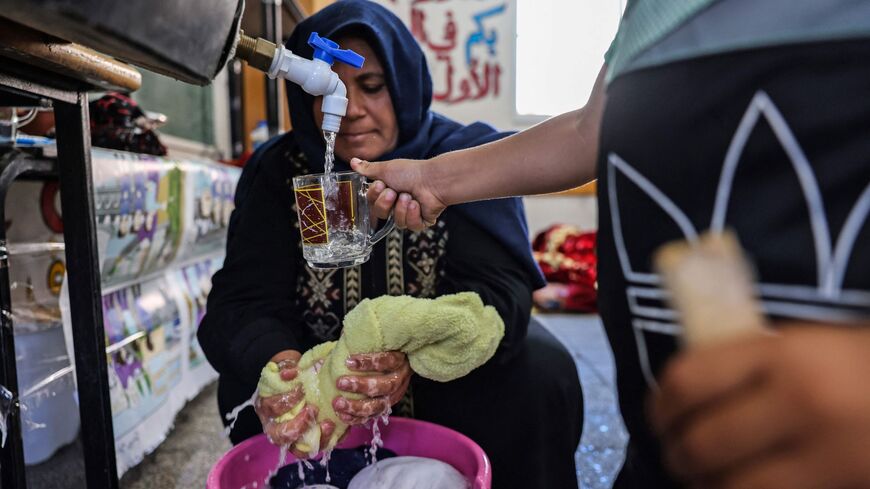The difficult economic conditions in Gaza have prompted women to resort to domestic work, a profession fraught with challenges as they live in a very conservative society.

A displaced Palestinian woman washes her family's laundry at a school run by the United Nations Relief and Works Agency for Palestinian Refugees (UNRWA) in Gaza City on May 18, 2021. - MOHAMMED ABED/AFP via Getty Images
Hadeel Al Gherbawi
Gaza
February 20, 2022 —
The bleak economy, the constant wars and the Palestinian division have pushed many women in the Gaza Strip to opt for domestic work.
House cleaning can be a lifeline for families who have lost their breadwinner, either due to divorce or death. But some workers face harassment or accusations of theft and are afraid to speak up, let alone go to court, for fear of losing their jobs.
H.D., 35, found herself working as a housemaid in central Gaza. She has five children to provide for. The $200 per month that her husband earns as a school janitor does not cover the needs of the family, so when a neighbor offered her $150 for housekeeping and for looking after her children and her elderly mother-in-law, "I reluctantly accepted because I had no other choice.”
H.D., who refused to reveal her name, told Al-Monitor that domestic work is socially stigmatized. “The people at the house always feel as if the maid is an intruder and they do not trust her. … When I would prepare the coffee, serve it and sit down to rest a little after a long day of hard work, the housewife would tell me, ‘Go to the kitchen, don't sit down here.’”
Um Ahmed, 33, has separated from her husband, leaving her to care alone for her three children. Her father is deceased and her mother is elderly. She lives with her family in a rented apartment. “My children and family have no one to provide for them," she told Al-Monitor. Even the $200 social affairs check that is paid every three months to poor families has been suspended for a year now. "So I resorted to my family’s Mukhtar [head of the family] in order to provide us with a good job. ‘I can offer you a domestic job either at a house or at a clinic,’ he told me.”
“Domestic work is a profession of exploitation, and [customers] take advantage of us with many jobs, such as washing the carpets, cleaning the house completely, and taking care of the children for an amount not exceeding $4 per day,” she added. “Moreover, the housewife often says, ‘Why didn’t you clean well? Clean this again!’”
She took a job at one house because the woman promised $200 per month, a higher figure than she had ever received in home service. But a month later, "her husband was taking advantage of his wife’s leaving for work and his children’s going to school and trying to get close to me. … On one occasion he got very close to me and tried to lure me with $6, but I took my purse and ran away from the house and never came back. I didn't dare tell anyone.”
Companies that provide domestic services, such as WECAN Serve And Clean, Ibn Sina Company, and White Pal provide uniforms for workers and work contracts that guarantee their rights. Hanan Barham, director of White Pal, told Al-Monitor, “The situation is unstable due to the repeated wars. I felt that opening a company to hire housekeepers was like a venture, and I faced many criticisms.”
She added, “My company provides contracts between the people who need the service and the service providers, provided housekeepers work in a safe environment free of violence. But unfortunately, despite this, we faced many difficulties that we had to solve in court.”
Among the applicants to work for her company, Hanan continued, are "university students who cannot afford to pay their tuition fees, so they opt for domestic work.”
“Domestic work is a new and very disturbing phenomenon in a tribal society where women’s dignity is a top priority," Fadel Abu Hein, a doctor of psychology at Al-Aqsa University, told Al-Monitor. "I see that girls are the ones knocking on people’s doors for work, so this is a dangerous phenomenon that should not spread."
But the reason it happens, he said, is "the deteriorating economic situation in Gaza and the lack of job opportunities for graduates. Due to men’s inability to meet the family’s needs and requirements, women resorted to domestic work, and when a woman owns a sum of money and starts showing it to other women, this prompts them to start looking for similar jobs.”
“The psychological impact this has on workers results from several variables, such as the outlook of the family to whom they work. Will they be treated well or ill? Will the family members treat them condescendingly? When workers are well treated, they feel good. But when they are treated ill and do not allow them to sit on their sofas, they feel humiliated,” he continued. “Society’s view [toward maids] could either be one of sympathy and pity, or one of defamation, both of which greatly affect workers’ psychological state.”
No comments:
Post a Comment